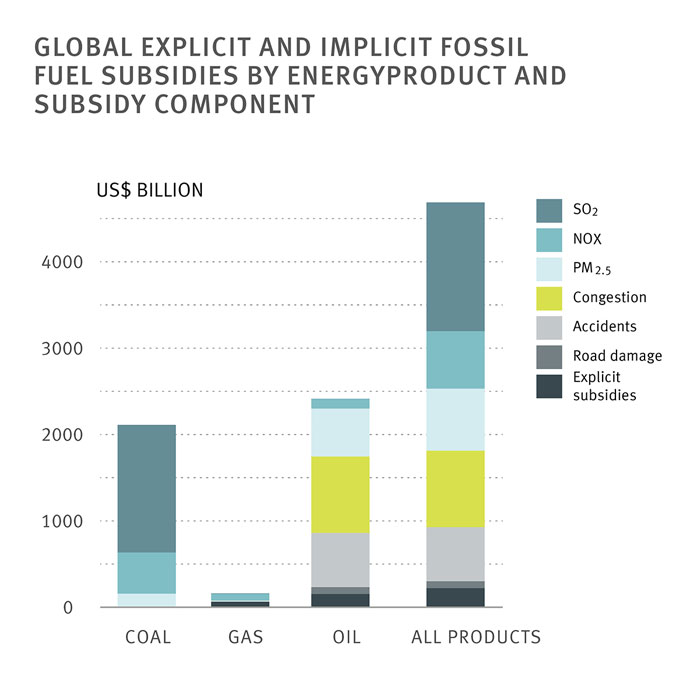Fossil Fuel Subsidies Are Detrimental to Prosperity, Public Finances and the Climate
New ZEW Study Shows Existing Potential for Climate Protection and Economic Progress
Reducing explicit and implicit subsidies for fossil fuels such as coal, oil and natural gas could lead to greater prosperity, rising tax revenues and significantly lower CO2 emissions, despite the resulting increase in energy prices. Moreover, according to a recent study by ZEW Mannheim, around a third of all countries worldwide could thus meet their climate targets – without needing any additional policies like carbon pricing. The reconciliation of economic, fiscal and climate policy goals would become easier than previously assumed.
“Many governments still help to keep fossil fuels cheap for consumers. For example, explicit subsidies are used to cover part of the supply cost, or external health costs associated with the use of fossil fuels are not included in prices because of implicit subsidies,” explains Professor Sebastian Rausch, head of the ZEW Research Unit “Environmental and Climate Economics” and co-author of the study.
Tim Kalmey, researcher at ZEW and also co-author of the ZEW study, adds: “Phasing out explicit subsidies, such as tax exemptions on kerosene or gas price ceilings, would only have a limited effect on CO2 emissions. It is crucial that also the local externalities of fossil fuels, i.e. the harmful effects on health caused by local air pollution, are factored in. We estimate that this would reduce global CO2 emissions by 32 per cent.”
Six trillion US dollars in subsidies worldwide
To date, subsidies for fossil fuels have been among the most frequently used state energy policies. According to the IMF, global direct subsidies amount to around 1.3 per cent of the global GDP. Implicit subsidies, which arise because the external costs of using fossil fuels are not included in prices, even come to as much as 5.8 per cent. In total, this amounts to almost six trillion US dollars worldwide.
Sebastian Rausch: “The unilateral elimination of explicit and implicit subsidies on fossil fuels would improve public finances in virtually all countries, generate considerable additional fiscal revenues and significantly reduce the economic costs of achieving the climate targets.”
If explicit and implicit subsidies were phased out in all countries, about a third of the countries worldwide could meet their climate targets without implementing any additional measures – for example China, India and Indonesia. But industrialised and energy-importing nations as well, such as Germany, the United States, Japan and the United Kingdom, would already meet over 30% of their climate targets by eliminating subsidies, according to the findings of the study.
More prosperity and tax revenues despite higher prices
The countries would have considerable fiscal resources at their disposal thanks to the savings in explicit subsidies and the revenue from pricing the external costs of fossil energy use. On average, states could generate tax revenues of 4.9 per cent of total consumption, with estimates ranging from 1.8 per cent to 16.2 per cent depending on the region. In addition, they would have to pay less for environmental and health damage and could prevent considerable additional economic costs arising from advancing climate change in the future. The economic consequences of higher energy prices could thus be offset, according to the authors of the study.
Sebastian Rausch: “Even if the abolition of all explicit and implicit subsidies for the use of fossil fuels worldwide seems to remain purely hypothetical, this perspective nevertheless reveals the economic costs in our economic systems, which are geared towards the use of excessively cheap fossil fuels.”
Data foundation
The study analyses the effects of explicit and implicit subsidies using a macroeconomic simulation model that represents the global economy. Detailed data on explicit subsidies for fossil fuels, external costs associated with the consumption of fossil fuels, and comprehensive national income and product statistics from the national accounts were used.
- Download ZEW Discussion Paper “The Welfare Effects of Explicit and Implicit Subsidies on Fossil Fuels”
- Download ZEW Policy Brief “Cheap Energy at What Cost?”
- Environmental and Climate EconomicsPress Relations and Editing
Source
ZEW – Leibniz-Zentrum für Europäische Wirtschaftsforschung GmbH 2025 | Fabian Oppel









